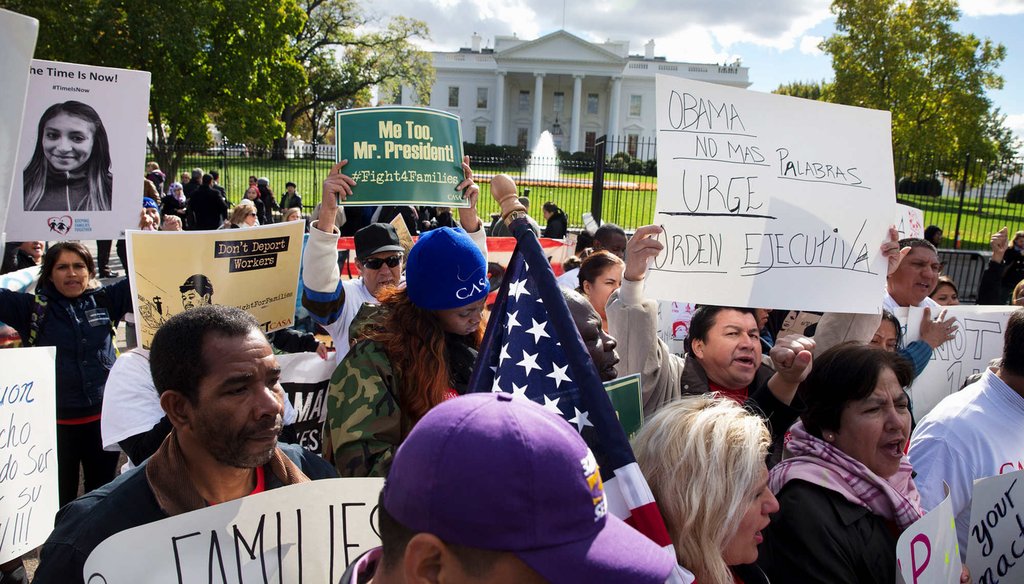Stand up for the facts!
Our only agenda is to publish the truth so you can be an informed participant in democracy.
We need your help.
I would like to contribute

People rally for comprehensive immigration reform, Friday, Nov. 7, 2014, outside of the White House. With executive action to defer deportations on the table, Republicans are split on how to respond. (AP Photo)
The fierce debate over immigration spits out oddly focused claims, apparently without limit. In the past few weeks, we’ve had to dig into the history of the Roman Empire, the travel habits of the undocumented and one line on Louisiana Gov. Bobby Jindal’s birth certificate.
Rev. Ryan Eller, executive director of Define American, a nonprofit promoting awareness of immigration issues, took us back to biblical times. On CNN, Eller said, "Jesus was an undocumented immigrant himself when he fled to Egypt seeking persecution in his day." (Eller told PunditFact he meant "escaping persecution.") "And so the question becomes, would we call Jesus himself illegal if he were, you know, in our modern times?"
Jesus’ immigration status obviously isn’t the most important part of his personal story. But people were curious if this piece of trivia holds up.
In short, it doesn’t. According to the bible, the man who became known as Jesus was taken by his parents from Bethlehem, in King Herod’s realm, to Egypt. But the world in which Jesus lived was all part of the Roman Empire, not necessarily a collection of separate sovereign nations. That makes it hard to call baby Jesus an illegal anything.
Clifford Ando, professor of classics, history and law at the University of Chicago, said historical accounts of the period offer an incomplete picture. But for the most part, we can say the empire did not restrict movement in a way comparable to requiring paperwork to cross provinces. There were customs stations in ports and on roads to tax goods, but nothing like a border patrol.
Sign up for PolitiFact texts
"Rome did think of itself as keeping loose track of the borders of the empire, and of course it took a periodic census, and so did loosely record where people resided and owned property once a cycle," Ando said. "That's not the same thing as saying you couldn't move."
We rated Eller’s claim False.
Travel and immigration go together like bacon and eggs, and we were struck when Jorge Ramos, a news anchor on Univision and Fusion, appeared on Fox News’ The O’Reilly Factor said that "almost 40 percent of all immigrants come by plane and they overstay their visas?"
Ramos and host Bill O’Reilly were having a spirited disagreement over the value of building a wall along the U.S. southern border, and that context, Ramos was speaking of undocumented immigrants flying into the country.
Ramos is far from the first person to deploy the statistic that 40 percent of unauthorized immigrants come into the country under a legal visa and then stay beyond its expiration date. Two Republican presidential candidates, Florida Sen. Marco Rubio and former Florida Gov. Jeb Bush, have said the same thing. When we checked Rubio’s claim, we rated it Mostly True.
However, Ramos’ statement adds the wrinkle that these people typically arrive by plane to rebut the notion that a wall would stop unauthorized immigration. As it turns out, it's hard to prove how they travel. In fact, the limited data we have suggests that whatever fraction flies into the country, it is less than 40 percent.
We spoke to some of the top independent analysts of immigration data and they all said the government really doesn’t have a complete picture. Based on some partial information, the portion of unauthorized immigrants who arrive by air could be about one out of four or over one-third.
The shakiness of all the numbers led us to rate this claim Half True.
Then we assessed a Facebook post by the activist liberal group Occupy Democrats on whether Louisiana Gov. Bobby Jindal is an "anchor baby." In this case, an anchor baby is a child through whom a noncitizen can craft a path to full citizenship. Any child born in America has the automatic right to citizenship.
Occupy Democrats wrote, "‘We have to end birthright citizenship to stop anchor babies,’ says Republican Bobby Jindal whose noncitizen parents arrived in the U.S. four months before he was born and used his birthright citizenship to become Americans, making him an anchor baby."
Jindal’s parents were not citizens when they arrived in early February 1971. According to his birth certificate, Jindal was born about four months later. His mother became a citizen in 1976 and his father in 1986.
Those dates tell us conclusively that Jindal’s birthright citizenship played no role at all in his parents becoming citizens.
Under the 1965 Immigration and Nationality Act, the child of immigrants can sponsor them to become permanent residents. The child must be a citizen and must be 21 or older. Once the parents are permanent residents, they must live in America for five straight years. After that, they can apply for citizenship.
If Jindal’s citizenship had made any difference, the earliest his parents could have been eligible would have been 1992, five years after he turned 21.
When his mother became a citizen in 1976, Jindal was 5, and in 1986, for his father’s naturalization, he was 15. It’s not even close.
We rated this claim Pants on Fire. (The post is no longer available on Facebook.)
These claims about immigration can get pretty esoteric, but running them down takes us into some interesting corners of history and law. We’ll be listening, reading and checking all through the presidential campaign.
Our Sources
See the individual fact-checks.




















































